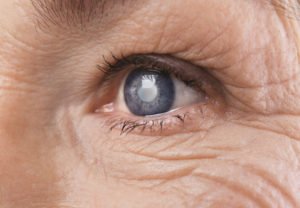
The California DMV can suspend or restrict a license due to a driver’s cataracts or macular degeneration. But it may only do so if the condition actually affects a driver’s ability to drive safely.
And even when driving ability is affected, cataracts and macular degeneration don’t always result in a lost license. Sometimes a driver can still drive safely with:
- Medical treatment,
- Driver safety classes, and/or
- Restrictions on when and/or where the driver drives.
How does the DMV find out I have cataracts or macular degeneration?
The DMV can learn about a medical condition affecting vision in several ways:
- The driver self-reports the condition on an application for a driver’s license renewal,
- The driver does poorly on a vision test at the DMV,
- The driver’s doctor reports the condition to the DMV (legally required),
- A concerned friend or family member confidentially (and optionally) reports a concern to the DMV, or
- A judge or law enforcement officer notifies the DMV of concerns about the driver.
But note that with the exception of a healthcare professional, none of these is required to report a driver’s vision problem to the DMV.
What happens when the DMV learns I have cataracts or macular degeneration?
The DMV will not usually suspend or revoke a driver’s license immediately after learning about a possible vision problem. It will only do this if it believes the driver represents an immediate danger.
More typically, the DMV will conduct a “reexamination” of the driver (also known as a “P&M hearing.”) During this hearing, the DMV will determine whether a driver has the physical and mental skills to drive safely. To do this, the hearing officer may:
- Ask the driver about his/her driving history or any specific incidents on the driver’s record,
- Take testimony from the driver and/or his or her doctor, and
- Have the driver take a vision test in front of the hearing officer.
Depending on what this reveals, the hearing officer may do any of the following:
- Let the driver keep his or her license without restriction,
- Require the driver’s condition to be monitored more closely,
- Place reasonable restrictions on the when or where the person can drive,
- Suspend the driver’s license temporarily, or
- Permanently revoke the driver’s license.
Drivers have the right to appeal the hearing officer’s decision. They may also be represented by a lawyer (at their own expense) during any stage of the process.

